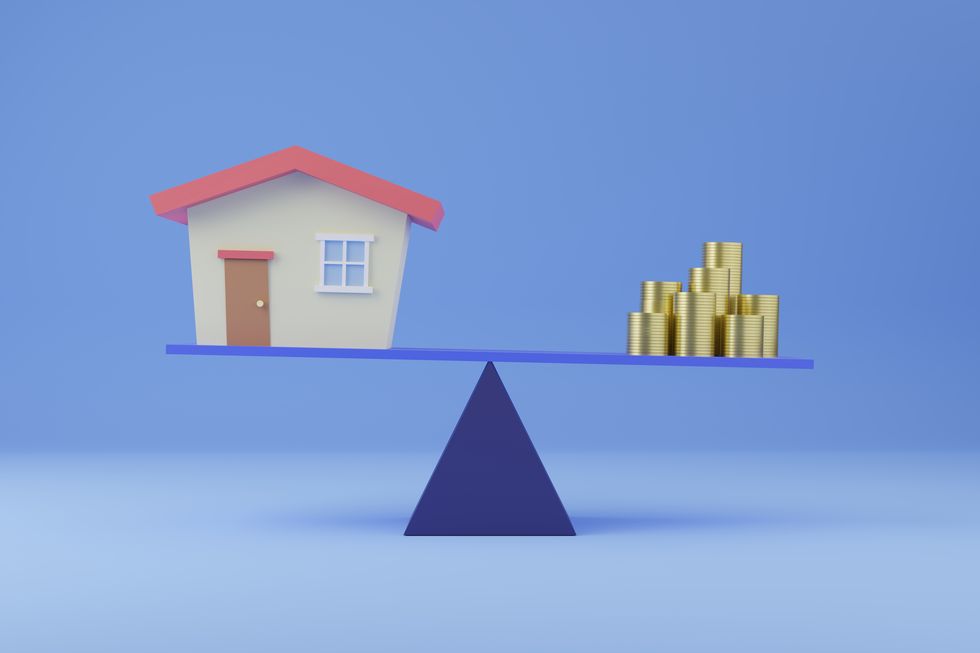Student loans can take a toll on a person’s bank account, but they can be just as taxing to one’s mental health. “It definitely can be a huge weight,” says Jonathan D. Friedman, a clinical psychologist with Baker Street Behavioral Health. And that weight, he explains, can spread out across a person’s life in a variety of ways, affecting everything from their self-worth to their relationships with money, family, and self-care.
“Many people with large student loan debt had no idea what they were getting into,” adds Naomi Angoff Chedd, a licensed mental health counselor and director of support services at Counslr. She highlights that many college kids took out loans without really understanding how finances worked — “and who does at the age of 19 or 20?” — and assumed they would get good jobs to pay them back, and didn’t anticipate the huge interest rates they would have to pay. This, she warns, leaves them angry and feeling duped while also experiencing guilt and hopelessness. Why did they take out those loans? And for what? And how are they ever going to get out of this mess?
Student debt can exacerbate — and cause — mental health issues
When it comes to things people stress about, finances frequently top the list. A survey by Policygenius found that 64 percent of Americans went into 2022 feeling anxious about their finances. Toss in the added weight of having student loan debt to pay off, and financial pressures can lead to stress, worry, fear, and frustration, says Friedman. “If this continues over a long period of time, it can lead to more significant issues that are stress-related, including anxiety disorders and depression,” he explains. And for those with mental health conditions, this pressure can worsen them.
Having debt that makes you feel like you can’t get ahead can result in a loss of control, a sense of vulnerability, and feeling powerless, all of which Friedman says can contribute to a decline in mental health. According to a CNBC survey, more than 60 percent of respondents say student debt has negatively affected their mental health, with women, young adults, and lower earners suffering the most. “But even middle-aged and older adults are experiencing anxiety and depression at alarming rates,” says Chedd. “They can’t even begin to save for their children’s or grandchildren’s college tuition or their own retirement, as they’re still paying off their own student loans!”
Student debt can hinder life goals
Student loans can be an obstacle to plans a person has for their future. “Too much debt, which students are surprised to realize how much they have to pay back at the end, can keep them from buying their first home, being ready to start a family, all those independent adulting activities,” explains Beth Pickett, founder of College Prep Counseling. The irony, she adds, is this debt can hinder the reason they go off to college in the first place, to be financially secure. When people find that these loans are dragging them down and preventing them from really being able to have the life that they expected a college degree would get them, that can take a mental toll.
Unbalanced debt between partners can cause relationship turmoil
If one partner comes into a relationship with student loan debt, it may cause some friction. “It can certainly create a wedge. Not everybody’s going to end up with that wedge, but plenty of people do, and that can lead to one party feeling resentful of the other, or vice versa,” says Friedman. And on the other hand, he notes, the person in debt may feel bad about themselves if their partner constantly brings up the subject. “Someone might say, ‘I’m tired of hearing your frustration with my debt. I’m the one that has to deal with it, and you don’t,’” Friedman explains.
If every time you want to go out for dinner or to a concert or put money into a retirement account, your partner brings up the need to save money because of that loan, it can create a great deal of tension, says Chedd. “That loan is always there, like an elephant in the room, and the elephant is going to live with you for many, many years,” she explains. And some couples may ultimately break up over this debt preventing them from being able to create an ideal future together. “If one person has $300,000 in debt, and the other person has $100,000 in debt, and no one’s making enough to really cover this, and the interest is going to capitalize, it can create questions and doubts,” Friedman adds.
A lingering loan balance can force self-care to the back burner
Stressing over debt can cause people to weigh out what’s worth spending money on. This could mean putting off going to the doctor, not keeping up with annual dentist appointments, and skipping out on therapy. “Self-care can get kicked to the curb or delayed to the extent that it is not a smart idea to be delaying it,” says Friedman. “If you’re looking at it like, ‘Well, I have to pay this loan, or I have to take care of myself,’ it can happen where people put the healthy decisions on the back burner because they think, ‘I just can’t afford that.’” Over time, that takes a toll, as research shows that mental health and physical health go hand in hand. For example, people who experience heart attacks are more likely to have depression and anxiety.
Caring for one’s family or considering starting a family tends to be a priority in the stage of life after college or secondary schooling. This makes it a very anxiety-ridden time with the addition of student loan debt, says Savannah Burton, LPC-MHSP, therapist and owner of MyMemphisTherapist Counseling and Consulting, LLC. “One may have thoughts of not being able to provide for his or her family, as repayment schedules are often income based with little room to negotiate repayment options,” she explains. These thoughts of inadequacy can often lead to depression and anxiety symptoms such as thoughts of worry, feelings of panic, extreme distress, and feeling overwhelmed.
Student loans can affect a person’s relationship with their finances
“Having a student loan to pay off, whether it’s several thousand dollars or, more likely, tens of thousands of dollars or more, impacts one’s entire outlook on spending and saving money,” says Chedd. Student loans can affect how and if someone is able to enjoy the money they do earn. This debt, she explains, “often makes sure that you can’t imagine a time when you will not have to shell out several hundred dollars a month or more, [and] whether you’re able to make the monthly payments on a new car, make a down payment on a home, and keep up with monthly mortgage payments or take a vacation.”
Pickett explains that student debt can also add a level of desperation to the job search right out of the gate. Feeling distressed entering the workforce can constrain one’s ability to have a sense of confidence during the interview process or when negotiating a salary, leading to just accepting the first offer from a company.
This negative money viewpoint is something that Burton has noticed in her own practice. “With my own clients that have student loan debt, I have seen financial-anxiety symptoms increase, thus producing an unhealthy correlation of fear with money that can start as soon one graduates college and enters the work force,” she says. “This negative relationship can last for years until the debt is paid off or one finally feels more financially secure.”
And John Li, co-founder and CTO of Fig Loans, says with heavy student loans weighing young people down, they begin to see debt as a normal way of life — “a thought process that can rack up consumer debt and an unhealthy relationship with money over the years.”
Government-issued freezes are a temporary solution
While student debt freezes, like the one issued by President Biden during the pandemic, can help some people make strides financially, Burton warns that not having a financial plan or knowing how to plan can create anxiety symptoms that can be hard to manage in the long run. “I tend to think most people, including my clients, would like to have a more finite answer to what is going to happen with their loans instead of riding the emotional roller coaster of frequent pauses and un-pauses,” she explains. This can be, however, a good time to come up with a strategy to tackle these loans.
On Wednesday, August 24, President Biden officially announced through an executive order that he will cancel $10,000 in federal loans for borrowers. This applies to those making less than $125,000 or in a household with a combined income of less than $250,000. For those who have Pell Grants, Biden has said that $20,000 of that debt will be canceled. He also extended the pause on federal loans. While there are still some hurdles with the debt-forgiveness program, like the Department of Education setting up an application process by the end of the year, this could mean mental relief for many people.
How to ease the mental burden
If you’re feeling overwhelmed with debt, try seeking out a mental health professional to talk you through your situation. You can find experts like Friedman who have experience helping patients navigate financial stressors, but any type of mental health professional, he says, should be able to provide emotional support.
Next, Friedman suggests coming up with a strategy to help gain control of the situation. “That lends itself to a sense of ‘All right, I’m more in charge, and loans are not as much in charge,’ as opposed to the reverse, which is what a lot of people experience,” he says. This strategy could involve setting aside a certain amount of money from each paycheck each month to chip away at loans, paying debt with the highest interest rates, like credit cards, or picking up a side hustle to help you eliminate your debt faster.
Pickett says to consider aggregating your loans so you’re making only one payment rather than payments to several different entities over the course of the month. “You can also try living at home for another year or two after college or living with roommates to put a lot of money from your first salary toward getting that debt paid down so you can get out from under that student loan as quickly as possible,” she explains. She also suggests job hopping every so often, “which can increase your salary by 5 or 10 percent.”
And try not to let your debt run your life. When things feel hopeless, find ways to nurture your mental health by engaging in free or low-cost activities that you find rewarding. Go for a walk with a friend, spend an afternoon reading at the park, or check out a new hike. And make sure to spend time with the people you love, as Friedman explains that having a support system to turn to when you feel overwhelmed can help you feel better.
One positive aspect to student debt, says Friedman, is that it can teach a person to learn the importance of managing their money. “Student loans and debt at an earlier time in life can also be a wake-up call to become more realistic about money and to become more practically oriented about money,” he explains. “It can be an education in and of itself.” Learning these skills may help a person make better financial decisions in the future.
Nicole Pajer is a freelance writer who has contributed to The New York Times, AARP, Woman’s Day, Parade, Men’s Journal, Wired, and Emmy Magazine. Follow her on Twitter @nicolepajer.
Get Shondaland directly in your inbox: SUBSCRIBE TODAY















